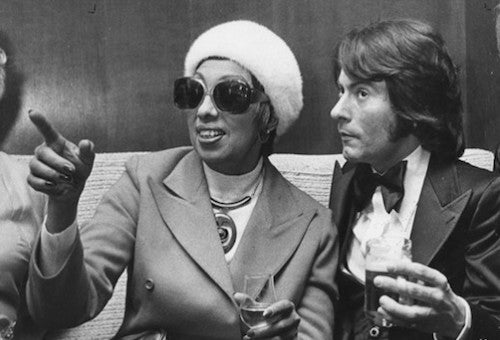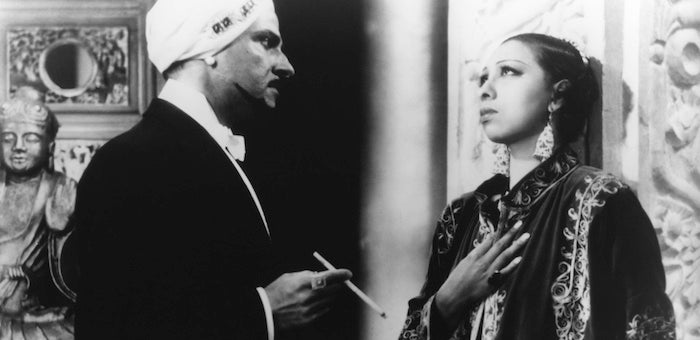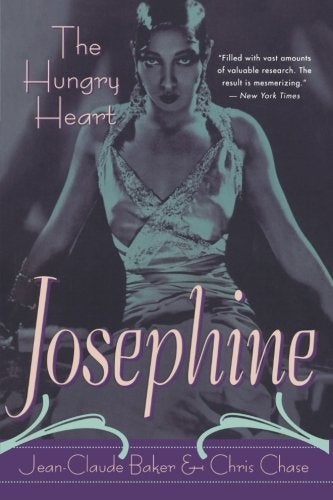
Josephine and Jean-Claude Baker
I remember seeing Josephine Baker on German television in the 1960s. Appearing in exotic, extravagant Las Vegas-style showgirl costumes, despite her 60 years, she would sing and dance and then bring out her pack of adopted children. It all seemed terribly old school. As a cocky, expatriate teenager, I have to say I was not too impressed.
It wasn’t until a decade later when I was a post-graduate intern at George Eastman House that I got to see a surviving fragment of Siren of the Tropics [La Sirène des tropiques] (1927), Josephine Baker's first film, where she plays an island native brought back to “civilization.” Even playing that stereotypical role, Baker’s strength and charisma shone through. “Natives gone civilized” (once cut off from nature) would become the narrative trope of all her films, including Princesse Tam-Tam (1935), her second sound film, which we preserved at Eastman House in the 1980s and then distributed through Kino International. I also accompanied both films on the road to introduce her work to audiences, who were eager to discover this forgotten phenomenon of black film history. It was in connection with those films that I met Jean-Claude Baker, one of her adopted children.

Princesse Tam-Tam (1935)
Mr. Baker had come up to Rochester, NY to see both films, since he was writing what would become a well-reviewed biography, Josephine Baker: The Hungry Heart (co-written with Chris Chase). From the beginning it was clear to me that Baker was neither an academic nor a professional writer, but he was a major fan. He was a slight man who, like Josephine, was a bit on the flamboyant side, but that served him well in his primary role as the owner and personal host of Chez Josephine, his themed restaurant dedicated to the memory of the performer. That French restaurant and piano bar is located on 42nd Street in New York between 9th and 10th Avenues, and was back then a less-than-fashionable outlier of the theater district. Shortly after the restaurant opened in 1986, my wife and I were invited to a party there in honor of the Nicholas Brothers, co-organized by Bruce Goldstein of Film Forum, following a show dedicated to the dancers. Relatively small and dark, the place featured royal blue  wallpaper, deep red curtains, red banquettes, and oversized posters and other memorabilia dedicated to Josephine on the walls. Although we returned a couple more times over the years to see Jean-Claude, the place was really out of our price range; Jackie Kennedy Onassis was a regular.
wallpaper, deep red curtains, red banquettes, and oversized posters and other memorabilia dedicated to Josephine on the walls. Although we returned a couple more times over the years to see Jean-Claude, the place was really out of our price range; Jackie Kennedy Onassis was a regular.
Jean-Claude was always a bit cheeky about his exact relationship to Josephine, so it wasn’t until I read his biography of Ms. Baker that I realized he wasn’t one of her orphans I had seen on television in the 1960s. In fact, Jean-Claude was not even an orphan, but rather born Jean-Claude Tronville to poor parents who married after his birth, then separated forever. He first met Josephine in 1958 at the Hotel Scribe in Paris, where he was working as a bellboy. But they would not become close until a decade later, when Jean-Claude, now the proprietor of a Berlin nightclub, Pimm’s Club, invited Josephine to perform. From that point until her death in 1975, he became her manager, butler, confidante and secretary, a relationship bordering on abusive. At the same time, he officially changed his name to Baker.
Josephine Baker: The Hungry Heart was in fact as much about Jean-Claude and his Oedipal relationship to his adopted mother as it was about Josephine. It had not been an easy life, despite the glamour. Sadly, Mr. Baker took his own life in January in his East Hampton home.
< Back to Archival Spaces blog






 Mobile Navigation
Mobile Navigation

